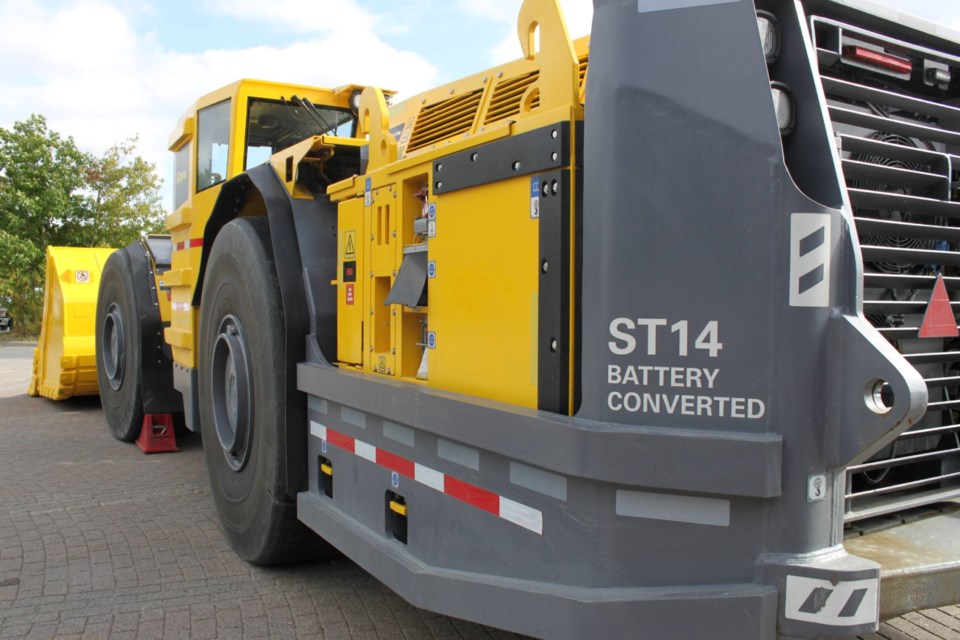As mining companies move to battery electric vehicles (BEVs) to improve performance, cost, and health and safety underground, Epiroc and Collège Boréal are teaming up to ensure workers have the skills to keep them operating efficiently.
The equipment manufacturer and the Sudbury college are getting ready to introduce the inaugural in-class cohort of its BEV maintenance program, which is the first of its kind to be developed in Canada.
Julie Nadeau, Boréal's director of business development, said the program came about after consultation with industry stakeholders.
"The motivation, really, behind developing the BEV program was a direct ask from the industry,” she said during a presentation at the CIM's 2022 Maintenance, Engineering and Reliablility/Mine Operators (MEMO) Conference, held Sept. 18-21 at Science North in Sudbury.
“We were approached by multiple mining companies asking if there was training that existed. When they realized it didn't, they realized as well that they needed to really invest in their workforce.”
Boréal announced the launch of the program in February 2020, and Epiroc came on board as an industry partner the following year.
The program will serve two purposes: it will train existing heavy duty mechanics in battery electric techniques, while also training newcomers to the workforce, she noted.
In shaping the course, Boréal's content developers met with a dozen industry employers — from mining companies to equipment manufacturers — to find out exactly what they needed their employees to learn, Nadeau said.
Employers told them that, aside from the basic BEV fundamentals, workers had to be familiar and comfortable with performing maintenance on a BEV. They emphasized the importance of hands-on training.
“This step was really key, which is why our partnership with Epiroc was really important for us,” Nadeau said.
“The program team has a direct link to this privileged relationship. So it allows the college to stay abreast of all the new practices, the new technologies, and so our curriculum and our testbench will always be up to date with the new technologies.”
What resulted is a three-part, 160-hour program that focuses on three main areas — battery technology, battery safety standards, and battery maintenance — which is offered in both English and French.
The basic course runs over a period of 40 hours, and that's followed by the instructor-led intermediate and advanced courses, which are held in the Boréal shop using testbenches developed by Epiroc.
Learners will also undertake a work placement as part of the course, and each participant will receive a certificate of achievement from Boréal upon completion of the program.
It's targetted toward electricians, millwrights, heavy duty maintenance workers, and technicians working for equipment manufacturers.
But Nadeau said there has been additional interest from project managers and financial officers in the industry who want to get a better understanding of BEVs and how they work.
Sweden-based Epiroc, which has locations in Sudbury, has been a leader in BEV technology, offering a range of drills, scooptrams, haul trucks, and other equipment since 2016.
Among the benefits of the technology, BEVs produce fewer emissions, less heat, and less noise, resulting in a cleaner work environment in general, noted Marquis Martel, a project manager in Epiroc's Rocvolt division.
That's why so many of the company's clients are now seeking to add BEVs to their fleets.
But new technology means operators and technicians need to develop an entirely new skill set.
“We're talking about integration between mobile mechanics, electricians to operator feedback,” Martel said.
“At Epiroc, it's very important to us that we collaborate with the electrical departments, the mobile departments, to be able to create this platform to best support our underground equipment or the mine's needs.”
In addition to offering feedback into the program's development, Epiroc also built the testbenches that students will use during the hands-on portion of the program.
Each bench replicates the workings of a full-sized BEV, using real components and functioning as a BEV would, but on a smaller scale, Martel said, so students get real-world experience with the tech.
He expects the benefits of the program will be felt industry-wide.
“This doesn't just benefit us as an OEM (original equipment manufacturer), but it also benefits the Vales, the Glencores, the MacLeans, the Toromonts, the whole industry as a base,” he said.
Despite a pandemic-related delay in rolling out the course, Nadeau said the college plans to begin offering the basic program this fall, and the intermediate program will get underway in January.
